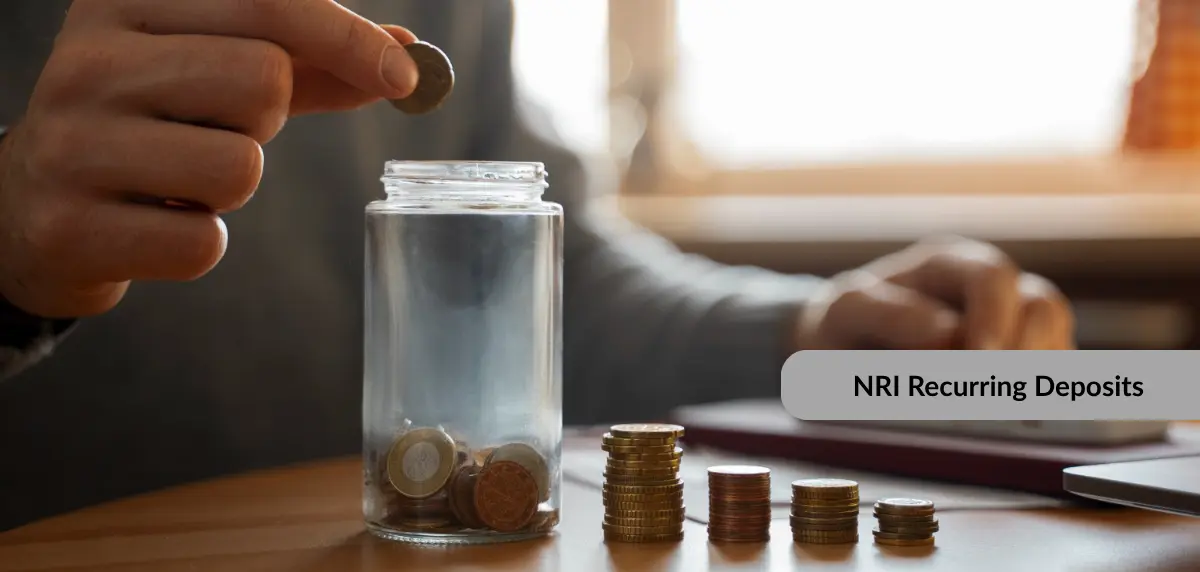If you are a Non-Resident Indian (NRI) looking to build a disciplined savings habit, recurring deposits (RDs) offer a simple and secure option. Much like regular RDs, recurring deposits for NRI accounts allow you to make fixed monthly contributions over a chosen tenure and earn interest on the total sum. You also get to enjoy minimal risk and assured returns.
Let’s explore NRI RDs and look at the points to consider before you choose the best RD for NRIs.
What are NRI Recurring Deposits?
A recurring deposit for NRI is a savings option where NRIs can deposit a fixed sum of money every month into a designated account. Over time, the deposit earns interest, and the corpus is paid back at the end of the term. It is a simple and risk-free way to build funds for future needs such as travel, home purchase, or education.
Now that you know what a recurring deposit for NRIs is, let’s look at the two types of NRI RDs based on the account type: NRO FD and NRE FD.
NRO RD (Non-Resident Ordinary Recurring Deposit)
An NRO RD is suitable for NRIs who earn income in India, like rent, pension, or dividends from stocks. This account is maintained in Indian rupees, and the interest earned on the RD is subject to taxation in India. The NRI RD interest rates on NRO accounts may vary from bank to bank.
NRE RD (Non-Resident External Recurring Deposit)**
An NRE RD account is meant for NRIs who earn in foreign currency and want to deposit the money in India. These accounts are also maintained in Indian rupees, but the money is fully repatriable (principal + interest), and the earnings are tax-free in India. An NRE recurring deposit helps NRIs park overseas income safely while enjoying attractive returns and currency appreciation benefits.
Key Features of NRI RDs
With this fundamental clarity on the meaning of NRO and NRE recurring deposits, you can now understand these savings options better. Let’s take a look at their features.
Fixed Monthly Contributions
With these types of RDs, you need to pay a fixed amount each month for a selected term, typically ranging from 6 months to 10 years.
Attractive Interest Rates
The NRO and NRE RD interest rates are competitive and vary from bank to bank. Some banks may offer higher returns for longer tenures or senior NRIs. You can use an RD calculator to get an estimate of the returns. Just as an FD calculator provides an estimate of returns on a lump-sum fixed deposit contribution, an RD calculator helps you get clear estimates for the returns on regular contributions.
Assured Returns
Since RDs are not linked to the market, they offer predictable returns. This makes them a safe choice for conservative investors. You can use an RD calculator to estimate the returns based on current rates.
Tax Treatment**
While NRE RD account interest rates are tax-free in India, interest earned on NRO RDs is taxable and subject to TDS (Tax Deducted at Source).
Repatriation Rules
While a NRE RD allows full repatriation, NRO RDs have limited repatriation as per RBI rules.
What to Keep in Mind Before Opting for NRI FDs?
Before you add NRI FDs to your investment strategy, make sure to keep the following points in mind:
Repatriation and Taxation**
NRE RDs are fully repatriable and tax-free in India. NRO RDs have restricted repatriation; plus, the interest is taxable.
Exchange Rate Risk
Since funds in an NRE RD are maintained in INR, changes in currency value can affect your returns when converted back to foreign currency.
Interest Rates
Different banks offer different interest NRI RD rates. Make sure to check the NRO and NRE RD rates across banks before investing.
Documentation
Ensure you have an active NRE/NRO account and provide the necessary ID, visa, and overseas address proof to complete the process.
Goal-based Planning
Whether you want to fund your child’s education or create an emergency fund, choose a recurring deposit option that matches your financial goals and complements your broader investment process.
For NRIs seeking a safe and steady way to grow their savings, NRI recurring deposits are a solid option. However, understanding what a recurring deposit is like for NRIs, its taxation aspects, repatriation rules, and current NRE RD interest rates is key to choosing the best RD for NRIs. Make sure to reach out to a financial advisor and get personalised guidance before adding an RD to your investment plans.
** Tax exemptions are as per applicable tax laws from time to time.
























